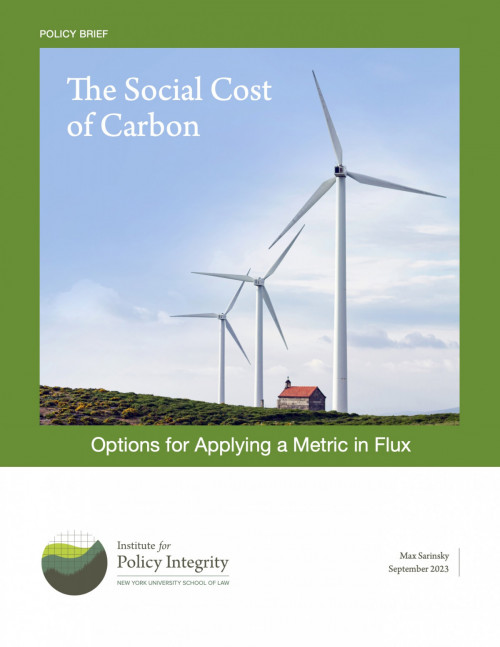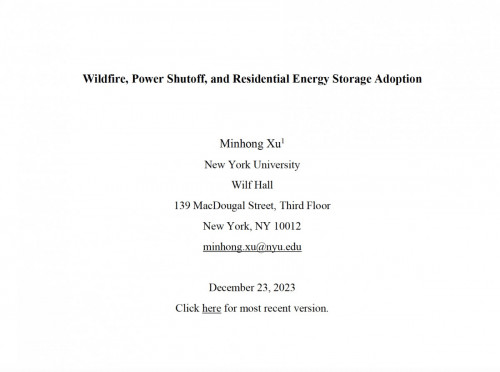-
Policy Integrity Comments Influence Order from Michigan Public Service Commission
In October 2023, the Michigan Public Service Commission issued an order in the benefit cost analysis (BCA) matter for which we filed comments in June. The order adopts several of our recommendations, and specifically cites us for several of them.
-
Comments to NHTSA on New Corporate Average Fuel Economy Standards
In August 2023, the National Highway Traffic Safety Administration (NHTSA) proposed a regulation to strengthen corporate average fuel economy standards for passenger cars, light trucks, and heavy-duty pickup trucks and vans. In a comment letter, we explain that while the Proposed Rule and its accompanying regulatory impact analysis offer useful starting points, NHTSA should take further steps to ensure the complete presentation of regulatory benefits and costs and should select a regulatory option that best promotes social welfare, consistent with the agency’s legal obligations. We also submitted joint comments with a coalition of other environmental groups on NHTSA’s use of the social cost of greenhouses gases in the Proposed Rule.
-
Comments to FERC in Support of Technical Conference on Capacity Accreditation
Policy Integrity submitted comments to FERC in support of American Clean Power Association’s petition for a technical conference on capacity accreditation. Holding a technical conference would be appropriate because accurate accreditation is becoming increasingly difficult as grids accommodate rapidly changing resource mixes with varying energy and reliability attributes, public policy constraints, and increasing/unprecedented extreme weather events. Moreover, accreditation has become more consequential, as capacity market revenues have grown to a significant share of total market payments. We included several questions that would merit discussion at the technical conference.
-
Comments to CEQ on Proposed Revisions to NEPA Implementing Regulations
In July, the Council on Environmental Quality proposed revisions to the implementing regulations under the National Environmental Policy Act. The Proposed Rule reflects a more holistic approach to informing agency decisions with a robust and balanced analysis of environmental impacts. In our comment letter, we suggested improvements to the proposal that would help ensure robust and balanced treatment of environmental impacts in NEPA reviews.
-

The Social Cost of Carbon
Options for Applying a Metric in Flux
Many states and other jurisdictions are grappling with how to value greenhouse gas emission reductions and trying to understand the rapidly developing climate economics and science involved in this task. Frequently, state governments and other jurisdictions value greenhouse gas emissions in policymaking using a tool known as the social cost of carbon.
While applying the social cost of carbon is conceptually simple, the appropriate value to place on the metric is in flux. In late 2022, the federal government released new, updated values of the social cost of carbon in draft form which, for now, remain unfinalized. So what estimates of the social cost of carbon should states and other entities use during this transition period? This policy brief explores the available options.
-
Comments to NJBPU on the Development of Natural Gas Utility Emission Reduction Plans
The New Jersey Board of Public Utilities is examining how to reduce greenhouse gas emissions from the state's natural gas sector in line with New Jersey's economy-wide emissions reduction goals. Policy Integrity submitted comments focused on the planning process and solutions needed to responsibly transition away from natural gas usage.
-

Wildfire, Power Shutoff, and Residential Energy Storage Adoption
Extreme weather poses a growing threat to electrical grid stability. On-site battery storage connected to solar power —known as a solar-plus-storage system—can buffer the impact. Despite its crucial benefits, the widespread adoption of this technology is hindered by its high costs. This study examines the impact of recent salient events—namely, preemptive power shutoffs to prevent wildfires, or Public Safety Power Shutoffs (PSPSs)—on residential solar-plus-storage adoption. I demonstrate that while communities at risk of wildfires lacked proactive investments before wildfire seasons, prolonged PSPSs increased solar-plus-storage adoption during the subsequent two months. This increased storage uptake can be attributed to heightened awareness of the need for backup power. Additionally, households’ choices between purchasing and leasing options were influenced by latent wildfire hazards and education levels. These findings highlight the role of risk awareness in promoting storage adoption and underscore the potential for using public information to enhance wildfire preparedness. -
Comments to NYSPSC on Its 2040 Zero-Emissions Electricity Goal
The New York State Public Service Commission recently issued an order seeking input on how to achieve the state's goal of a zero-emissions electricity system by 2040, as required by the Climate Leadership and Community Protection Act (CLCPA). Policy Integrity submitted comments focused on issues such as the relationship between the Commission’s 2040 zero-emissions goal and other elements of the CLCPA, the need for analytic frameworks that rely on best available science and economics, the circumstances under which hydrogen could qualify as a zero-emissions resource, and tracking benefits to disadvantaged communities.
-
Comments to EPA on GHG Regulations for Fossil Fuel-Fired Power Plants
In May 2023, EPA proposed a package of regulations to limit greenhouse gas emissions from fossil fuel-fired power plants under Section 111 of the Clean Air Act. This proposal included revisions to strengthen the limits for new gas fired-plants and to establish limits for existing coal-fired plants and some of the largest, existing gas-fired plants. To determine the stringency of these limits, EPA identified “best systems of emission reduction” (BSERs). In our comments we explain how EPA’s has selected BSERs that are traditional in scope and consistent with the legal pathway left intact by the Supreme Court’s decision in West Virginia v. EPA. We also recommend that EPA strengthen the design of the rule to ensure it best fulfills its goal to reduce GHG emissions, which endanger public health and welfare, in a manner that avoids creating perverse incentives.
-
Plenary Remarks at the New Jersey Board of Public Utilities Technical Conference on Natural Gas Emissions Reduction
On August 2nd and 3rd, the New Jersey Board of Public Utilities (BPU) hosted a Technical Conference in order to engage with stakeholders and investigate how the natural gas industry can best meet a 50% reduction in greenhouse gas emissions below 2006 levels by 2030. Jenn Danis gave plenary remarks on this topic during the second day of the conference. Her remarks focused on the need for holistic, long-term gas planning at the level of the state utility regulator. Without this planning, BPU will not be able to fulfill its responsibilities, which include ensuring just and reasonable rates for consumers as well as protecting gas utilities that will continue to provide crucial services for some time.
Viewing recent projects in Climate and Energy Policy










